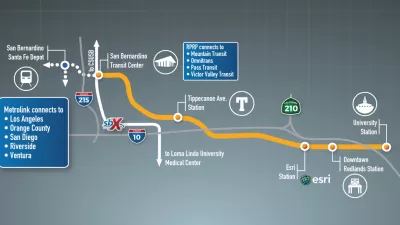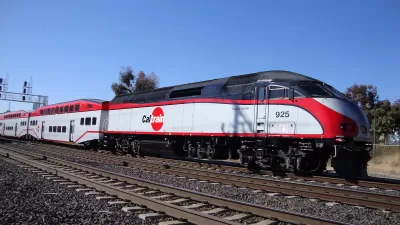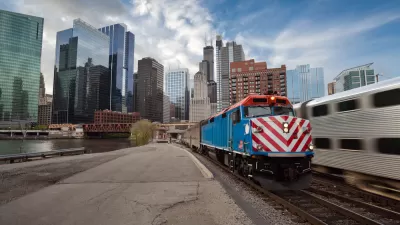In addition to commuter trains hauled by an electric or diesel-powered locomotive, there are EMUs and DMUs, and come 2021, for the first time in North America, there should be a ZEMU thanks in part to a $30 million California transportation grant.
Electric multiple unit (EMU) and diesel multiple unit (DMU) trains, where electric traction motors or on-board diesel engines, respectively, are housed in one or more of the passenger cars, are not new. Denver's new A Line and Long Island Rail Road trains are EMUs, with the former receiving power by overhead catenary and the latter by third rail. See the last section of this post on a funding award for Caltrain EMUs.
In California, the SMART and Sprinter (light rail) trains are DMUs, and Tri-Rail in Florida operates Colorado Railcar diesel multiple units.
The Redlands Passenger Rail Project, one of the newest passenger rail projects in California being built by the San Bernardino County Transporation Authority (SBCTA), will operate diesel multiple unit trains. The nine-mile rail line between Redlands and San Bernardino is scheduled to begin service in 2021.
The project was among the 28 transformative projects [see #15 in pdf] selected to receive funding on from the Transit and Intercity Rail Capital Program, administered by the California Department of Transportation (Caltrans) in collaboration with California State Transportation Agency (CalSTA). See Monday's post, "$4.3 Billion Awarded to California Transformative Projects from Gas Tax and Climate Fund."
"The [$30 million] grant was awarded for a pilot program to deploy Zero Emission Multiple Unit [ZEMU] commuter rail vehicles on the Redlands Passenger Rail Corridor in San Bernardino," writes Assemblymember Eloise Gómez Reyes, who represents the district.
With this funding SBCTA and the region will be national leaders in the deployment and testing of near zero and zero emission commuter rail trains... As this new technology grows in use we will see real benefits in reduced traffic congestion and reduced impacts on air quality while putting San Bernardino on the map as a testing hub for green technology.
According to CalSTA, the "conversion includes statewide testing that could impact future equipment acquisition for other rail services, like Metrolink, statewide."
The grant does not specify what type of technology, which presumably would be either battery-electric or fuel cell, also called hydrail, which would include near-zero emissions as the hydrogen could be burned rather than converted to electricity. A fuel cell train is already in operation in Germany, as a November 2016 post on the Coradia iLint, built by French rail technology provider Alstom, foreshadowed.
Another zero-emission trainset based on batteries is being developed by Swiss manufacturer Stadler Rail for Arriva Netherlands, reported Railway Pro last November.
Diesel emissions
Even without conversion to zero-emissions technology, the DMUs on the Redlands line will be powered by the cleanest diesel engines available, known as Tier 4 compliant, meeting the highest standards set by the U.S. Environmental Protection Agency and the California Air Resources Board for off-road, diesel-powered engines.

Courtesy of Diesel Technology Forum
According to the projects August newsletter, the engines will be "[a]kin to a hybrid car in that the DMUs convert a cleaner diesel form of power to electricity to efficiently drive the vehicles to their destination.
Transit and Intercity Rail Capital Program award for Caltrain electrification
While electrification construction has begun, having received a $647 million Federal Transit Administration grant that the Trump administration initially delayed, the Peninsula Corridor Joint Powers Board, which owns and operates the Caltrain line operating from San Francisco to Gilroy, only had enough funds to convert about three-quarters of their trains to electric multiple units.
On April 26, the board was informed it would receive a $164 million grant [see #13 of Project Detail Summary (pdf)] to convert the remaining 25 percent of diesel-locomotive-hauled trains to zero-emissions EMUs. Unlike the Redlands train project, Caltrain uses mostly older locomotives, so the conversion will literally mean cleaner air for Peninsula residents, at least from trains.
Zachary Clark of the San Mateo Daily Journal reports on the Caltrain award, along with a $253 million grant for the San Mateo Highway 101 Managed Lanes project and $36 million grant for SamTrans to run an express bus pilot when the express lanes are constructed and operating, potentially in 2021.
FULL STORY: Funding for San Bernardino Area Rail Project Approved by the California Transportation Agency

Planetizen Federal Action Tracker
A weekly monitor of how Trump’s orders and actions are impacting planners and planning in America.

Maui's Vacation Rental Debate Turns Ugly
Verbal attacks, misinformation campaigns and fistfights plague a high-stakes debate to convert thousands of vacation rentals into long-term housing.

San Francisco Suspends Traffic Calming Amidst Record Deaths
Citing “a challenging fiscal landscape,” the city will cease the program on the heels of 42 traffic deaths, including 24 pedestrians.

Amtrak Rolls Out New Orleans to Alabama “Mardi Gras” Train
The new service will operate morning and evening departures between Mobile and New Orleans.

The Subversive Car-Free Guide to Trump's Great American Road Trip
Car-free ways to access Chicagoland’s best tourist attractions.

San Antonio and Austin are Fusing Into one Massive Megaregion
The region spanning the two central Texas cities is growing fast, posing challenges for local infrastructure and water supplies.
Urban Design for Planners 1: Software Tools
This six-course series explores essential urban design concepts using open source software and equips planners with the tools they need to participate fully in the urban design process.
Planning for Universal Design
Learn the tools for implementing Universal Design in planning regulations.
Heyer Gruel & Associates PA
JM Goldson LLC
Custer County Colorado
City of Camden Redevelopment Agency
City of Astoria
Transportation Research & Education Center (TREC) at Portland State University
Jefferson Parish Government
Camden Redevelopment Agency
City of Claremont





























